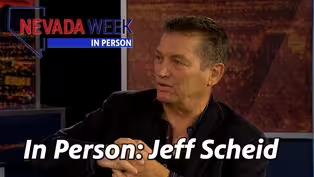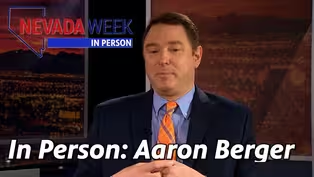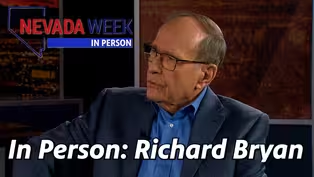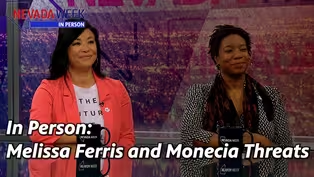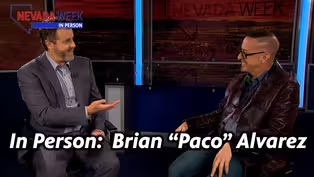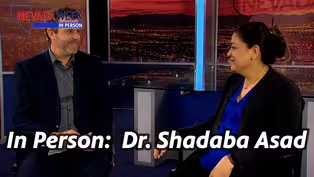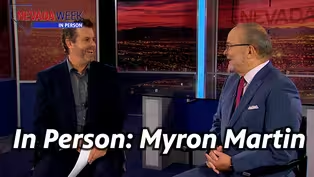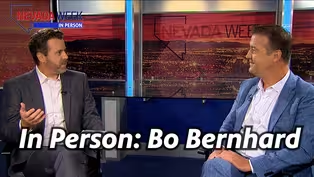
Nevada Week In Person | Federico Zaragoza
Season 1 Episode 3 | 14mVideo has Closed Captions
An in-depth and personal conversation with CSN President Federico Zaragoza.
We talk with College of Southern Nevada President Federico Zaragoza about his plans for moving the college forward.
Problems playing video? | Closed Captioning Feedback
Problems playing video? | Closed Captioning Feedback
Nevada Week In Person is a local public television program presented by Vegas PBS

Nevada Week In Person | Federico Zaragoza
Season 1 Episode 3 | 14mVideo has Closed Captions
We talk with College of Southern Nevada President Federico Zaragoza about his plans for moving the college forward.
Problems playing video? | Closed Captioning Feedback
How to Watch Nevada Week In Person
Nevada Week In Person is available to stream on pbs.org and the free PBS App, available on iPhone, Apple TV, Android TV, Android smartphones, Amazon Fire TV, Amazon Fire Tablet, Roku, Samsung Smart TV, and Vizio.
Providing Support for PBS.org
Learn Moreabout PBS online sponsorshipMore from This Collection
Nevada Week In Person goes beyond the roundtable discussion of Nevada Week with guests for a more casual conversation about their personal passions, new projects and compelling stories that are overlooked in the flurry of the news cycle.
Nevada Week In Person | Jeff Scheid
Video has Closed Captions
A one-on-one interview with longtime Southern Nevada photojournalist Jeff Scheid. (14m)
Nevada Week In Person | Aaron Berger
Video has Closed Captions
We talk with the executive director of the Neon Museum, Aaron Berger. (13m 59s)
Nevada Week In Person | Richard Bryan
Video has Closed Captions
Retired Nevada Senator Richard Bryan talks about his life in service of the state. (14m)
Nevada Week In Person | Monecia Threats and Melissa Ferris
Video has Closed Captions
Monecia Threats and Melissa Ferris talk sports in Las Vegas. (14m)
Nevada Week In Person | Brian ‘Paco’ Alvarez
Video has Closed Captions
A personal interview with arts and culture curator Brian ‘Paco’ Alvarez. (14m)
Nevada Week In Person | Dr. Shadaba Asad
Video has Closed Captions
Infectious disease expert Dr. Shadaba Asad on the coronavirus pandemic. (14m)
Nevada Week In Person | Myron Martin
Video has Closed Captions
An in-depth personal discussion with Smith Center CEO Myron Martin. (14m)
Nevada Week In Person | Bo Bernhard
Video has Closed Captions
An in-depth conversation with Bo Bernhard from UNLV about his work with the university. (14m)
Providing Support for PBS.org
Learn Moreabout PBS online sponsorship♪♪♪ Support for Nevada Week In Person is provided by Senator William H. Hernstadt and additional supporting sponsors.
(Kipp Ortenburger) The College of Southern Nevada is an important part of Southern Nevada's education network.
It provides workforce training for those looking for a new career.
It also allows a place for non-traditional university students to get an education they put off, and it provides a step for high school students to get into the university system.
Well, the person leading that college is Federico Zaragoza.
He was named president of CSN in 2018.
He has led the college through the challenges of the pandemic and now will lead CSN in what will hopefully be a post-pandemic world.
Federico Zaragoza, welcome so much.
We really appreciate it.
-Thank you for having me, Kipp.
-I want to just extend the conversation, and we didn't get a chance necessarily to talk specifically about community college so much.
I want to come back-- we'll talk about the pandemic I think in a second, but I want to come back and talk about what I read when you came in in 2018, what was in the press.
One of the things they highlighted were the graduation rates that increased in Alamo Colleges, where you came from, 9% to 20%.
Graduation rates aren't something that we really think of sometimes as an indicator in community college simply because a lot of times it's identified as a stepping stone to go to a four-year college or potentially go to a career.
Why are graduation rates so important?
(Federico Zaragoza) Kipp, graduation rates and student success rates, which are two different things, are very important because that's an indicator, a metric of success, and that's what should be guiding our curriculum and why students come to colleges like the College of Southern Nevada.
And I need to tell you when I came to CSN, I believe the published rate was a 7% graduation rate and, again, when you look at very large colleges, it wasn't an outlier.
Unfortunately in urban areas, graduation rates aren't comparable to those in smaller and midsize community colleges.
But since I've gotten here, we've actually increased our graduation rate.
Our new IPEDS graduation rate is 18%, but that's not the metric of success.
The metric of success is why students come to CSN, and half the students that come to CSN come to transfer to universities.
And when you add 25% to that, that means almost 40% of our students are now succeeding, meeting their own personal goals and objectives, so we're very excited.
I mean, we're now being discussed in the high-performing group nationally and have gotten a lot of national recognitions because we've done it very quickly.
Part of it is we came in with an agenda that was already in place.
It's an element of bringing in best practices to the community college environment, so we're very pleased to suggest that, you know, our students coming to CSN are becoming successful given graduation and transfer rates.
-As you mentioned this is staying with the plan that came before you came, but I would imagine there's little tweaks you do in the system to increase graduation rates right here.
I mean, are there little things you've been able to do to kind of see big success?
-Oh, absolutely.
And when I say "we," I mean it's collective, I think, what we've been able to do here at the College of Southern Nevada.
But creating that culture I think, a welcoming culture where students know they're appreciated, and then building the support systems because it's not all about the curriculum.
It's about those support systems, whether it be academic support, whether it be the ability to get advicing information, and then the motivation, to be able to see others like them that are succeeding in certain career pathways.
So it's really been improving the student experience for the CSN student, and we've really focused on that and we've invested in that.
We've seen our advisor rates, for example we have a target now that we want to be able to have one advisor to every 150 students.
When I came it was more like one to 1,200 students.
So we've been very focused and intentional in the kinds of investments that we're making to make that student experience as good as possible.
And then our whole mantra now is "Students First."
Everything we do is about students.
-You have two years, roughly.
You probably have students that are there longer than two years but a two-year program.
You don't have as much time to connect with each student so I would assume you have to be more intense, more directed, more strategic in how you are reaching students.
The other side of this I want to bring up is college is so much about all the things you mentioned, and it's also about college life too which we don't always connect with community college.
What is CSN trying to do to kind of bring that culture of college in more?
-Kipp, think of this as bimodal.
So you have a group of students that are very traditional students.
They graduate from high school, and they come to College of Southern Nevada.
Many of those are coming in with the goal of transferring to university.
So you've got that pathway, and the vast majority of those students are full-time students.
Again, they're in the age group of 18-24.
So we have a significant number of students that would be traditional college students, and for them, they're on campus.
You know, we built now student unions so they have a place they can gravitate to.
We've created events for them that are relevant.
We've created that support system.
We've actually diversified our sports programs, et cetera.
So we try and create that expected, right, student experience for those traditional students, but then 70% of our students are part-time students.
And these are working adults, these are individuals that are here with us more like seven years than three years, and they're the vast majority of our student body.
That's a non-traditional group, and that's where we need our support systems because many of them may need daycare, many of them are working, and again, food insecurity is a challenge for us.
Many of our students are doing everything possible to stay in the higher education experience, but life happens.
And those are our students.
You know, the vast majority of community college students are non-traditional students and come from working families, 70% of our students are minority students, and 95% of those students live in this community and many in the underserved areas of the community.
So College of Southern Nevada I think is truly a community college, and we try and provide the right experience depending on where people are, and we align our programs to where people are at the time that they come to us.
-I want to talk a little bit about your background and how you actually got to CSN.
I want to talk about your education.
We talked about this in the green room a little, but I found it very interesting.
Undergrad was in sociology, master's in vocational ed, your PhD in urban education.
I mean, we can see the trajectory to you becoming a leader at a community college but sociology, we started talking about that.
How does sociology play into leadership and also the direction of a community college?
-Kipp, think about it.
I mean, even now I consider myself a sociologist.
It's that context of understanding culture and how people act in groups and environments, and then you get into the social institutions part of it which is my doctorate degree, and you hear elements like institutional bias, institutional discrimination, all of that, and to me that means something.
It's clearly, you know, an element of my job and I think that sociology perspective has served me well.
I think it also makes the point that when we talk about jobs, we really don't know what the jobs of the future are going to be but we know what the skill sets are going to be, and those critical thinking skills that you learn in disciplines like sociology are going to be very instrumental, very helpful I think in individuals to be able to connect to those jobs of the future.
We just need to know how to market ourselves and to understand that we are learning these competencies that have value in the workplace.
-And something we didn't talk about on Nevada Week.
I wish we did, we ran out of time, but the soft skills development here as you mentioned, right?
Social skills, the right emotional skills, become so important than the actual physical skills that you're learning per whatever industry you're doing.
A community college, CSN, how do you teach or continue to teach those types of skills?
-Kipp, there is nothing soft about soft skills.
I mean, really these are critical skills now that have to be embedded in the curriculum, and I'll give you an example.
I think, you know, we've all known the basic skill kind of context where the reading, the math, the comprehension side of the house, those have been constant for many years, but now some of the growth areas are areas like information technology.
Computer literacy now is a soft skill of sorts.
You need those to survive in the environment that you're in to be productive.
And then issues like leadership now and team building and the ability to work with information and data, to able to write and communicate through essays and otherwise, these are all the post-COVID, if you will, soft skills that are now so critical in this kind of future work environment which we're already seeing, and a lot of this is technology driven.
I mean, to be able to be successful in that interaction with technology, it's going to require higher cognitive skill sets.
-Yes, and it is so important to think of it in that manner of technological soft skills in addition to the people person soft skills we're talking about.
I want to come back to another personal question too.
Similar to your education, where you've lived is very, very diverse.
You were born in Mexico, you grew up in Texas, went to school in Wisconsin-- I might be leaving some of your school out-- back to Texas, then to Las Vegas.
Explain that progression to Las Vegas.
-Las Vegas was, I think, for me my legacy opportunity.
I had been the vice chancellor of economic and workforce development at the Alamo Colleges, and we had seen that community within a 20-year period emerge as a national leader in economic development, and the community colleges emerged as one of the best in the country.
But that was the journey.
When I started, it was by far not the high-performing system that it is now, and I wanted to be at the head, if you will, of a transformational effort and I think the College of Southern Nevada gave me that opportunity.
And this community gives me that opportunity because it reminds me a lot of where San Antonio was maybe 20 years ago as it emerged from a tourist and military city into a diverse economy, and we're beginning to see this year with kind of the advanced manufacturing, the IT sectors growing, the logistics.
So for me the opportunity was to bring those skill sets and to apply them and to again be a part of that very exciting journey of seeing a community emerge as a force nationally, and I think that's what's happening in Las Vegas.
-You might have already answered this, but I mean, what has surprised you pleasantly the most about living in Las Vegas?
-You know, it's a large but small city.
It's very collaborative and it's very easy to build relationships, and that really surprised me.
Again, the Strip kind of image and somehow, you know, those lights take away from the real substance of this community which are its people.
-Yes, very true.
A couple quick questions for you.
Nevada's most important asset is... -Its people.
-People.
-Yes.
-What do we need more of here?
-Collaboration, it's always good.
-What do we need less of?
-Conflict.
-Yes, that comes up a lot in the interviews we've done so far.
The next big thing in Las Vegas will be... -I think it's going to be automation.
I think it's advanced manufacturing.
Diversification of the economy.
-Yes.
Favorite part of CSN to go yourself?
-Of CSN?
-Yes.
-The student unions, where my students are.
-Favorite part of the Las Vegas Valley to go to.
-I love water, so Lake Mead or Lake Las Vegas.
I love that.
-There's not much of it.
We just have a couple lakes, that's about it.
-But I get out there as often as I can.
-You might have already answered this then, best thing to do on a weekend?
-Shows, I love shows.
My wife and I go out as much as we can to see these wonderful Vegas shows.
-Really?
What's your favorite thus far?
-Well, you know, I saw Alejandro Fernandez.
I saw the Righteous Brothers, and I tell you, I loved that.
So yes, I'm out there.
-And best thing to do to spend an hour unwinding at work?
-The gym.
The gym is always helpful.
-Well, thank you so much.
We really appreciate your time very much, and best of luck to you.
-Thank you, Kipp, I really appreciate it.
-Well, for an in-depth conversation about what the college is doing to address workforce development in Southern Nevada, check out Nevada Week at 5:30 p.m. on Sunday or 7:30 p.m. on Tuesday.
You can also always find us anytime on vegaspbs.org/nevadaweek and follow us on Facebook and Twitter at @nevadaweek.
Thanks a lot.
♪♪♪

- News and Public Affairs

Top journalists deliver compelling original analysis of the hour's headlines.

- News and Public Affairs

FRONTLINE is investigative journalism that questions, explains and changes our world.












Support for PBS provided by:
Nevada Week In Person is a local public television program presented by Vegas PBS
